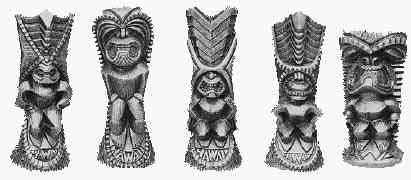| Home | Online Store | What is Milimili? | History Tours | Fairy Tales | About Us | Retail Stores | Order Info | Milimili Cards | Contact Us | Banner Exchange | |
| Discovery | Hawaiian Aliis | Tikis | Maneki Neko |
| Tiki |
 |
Hawaiian sculptural traditions are closely linked to the ancient
Hawaiian religion which ended with the overthrow of the old gods when Christianity
was imported to the islands. The images depicted in this Milimili Doll series
are symbolic renditions of the more powerful of the ancient Hawaiian gods or
akua. The word tiki is actually as misnomer as there is not a letter "t"
in the written language of the Hawaiians. It is unclear as to when the word
tiki became associated with these examples of Hawaiian sculpture.
|
The supreme deities or principal akua were
Ku, Kane, Lono, and Kaneloa. |
|
Ku was the most aggressive and active one and often was associated with war.
Ku (male or husband), and Hina (female or wife) were the rulers of the ancient people and are the earliest gods. They are great ancestral gods of earth and heaven who have general control over the bounty of earth and generations of mankind. Ku freed one from their faults and errors. He is associated with sacrifice and prisoners. Ku represents the East, or the sun rising, which indicates morning. Ku equals "rising upright." Hina represents the West, or the sun setting, which indicates evening. Hina means "leaning down." Ku represents the universal character as a god to worship. The Ancient Hawaiians worshiped Ku for things such as good fishing, long life, good crops, and family and national prosperity for a whole. For example, early in the morning, prayers are said by fishermen to Ku to help them with their fishing. These things are represented in the following prayer:
"Ku, O Li! Soften your land that it may bring forth. Bring
forth where? Bring forth in the sea [naming the fishing grounds], squid, ulua
fish... Encourage you land to bring forth. Bring forth where? Bring forth, on
land, potatoes, taro, gourds, coconuts, bananas, calabashes. Encourage your
land to bring forth. Bring forth what? Bring forth men, women, children, pigs,
fowl, food, land. Encourage your land to bring forth. Bring forth what? Bring
forth chiefs, commoners, pleasant living; bring about good will, ward off ill
will".
Kane was the leading god of the great gods named
by the Hawaiians. He represented the god of procreation and was worshipped as
ancestor of chiefs and commoners. Kane is the creator and gives life associated
with dawn, sun and sky. According to the possible late edition of the Kumuhonua
legend, he formed the three worlds: the upper heaven of the gods, the lower
heaven above the earth, and the earth itself as a garden for mankind; the latter
he furnished with sea creatures, plants, and animals, and fashioned man and
woman to inhabit it. No human sacrifice or laborious ritual was needed in the
worship of Kane.
Lono, usually called Lono-makua(Father Lono) was the most humane of the three primary akua. He cared for the crops, maturation, fertility, forgiveness, healing, and other life-sustaining aspects of life. Hawaiian legends tell of Lono appearing to the people many hundreds of years ago and promising to return someday. Captain James Cook was mistakenly identified as Lono when he arrived in the Islandsbecause of these verbal traditions. Hawaiians who accepted Christianity also associated Lono with Jesus Christ. During the rainy winter months of the year, Lono became the dominant akua because warfare was kapu (taboo or forbidden) during this time and the worship of Ku and Kane were temporarily suspended.
The clouds and the phenomena of storms are also associated with Lono. When the statement, "with head hidden in the dark clouds above" is recited, it is usually referring to Lono. During prayer to Lono, signs of the god are named thunder, lightening, earthquake, the dark cloud, the rainbow, rain, wind, whirlwinds that sweep the earth, waterspouts, the clustering clouds of heaven, and gushing springs on the mountains. Lono brings on the rains and dispenses fertility. Lono is the god of harvest. Lono-makua (Father Lono), is the name given to portray the god during the Pre-Contact time. Lono's role has generally confined to the celebration of games.
Kaneloa was a lesser or secondary akua closely associated with Kane. Kaneloa is the old Polynesian sea god of death, darkness, water, and squid. Under the influence of sorcery, Kane has the character to heal:
"Kaneloa, god of the squid, here is your sick man... "
...and ends with an excellent objective description of squid catching. Fishermen will use him for protection but he is looked upon with distrust as an aumakua. There is a legend that the Ancient Hawaiians told about Kaneloa:
Kaneloa is associated with the Christian devil. His name is associated
with various legends of strife against Kane in which Kaneloa and his spirits
rebel and are sent down to the underworld. In the legend of Hawaii-loa belonging
to the Kumu-honua epic account of the Kane tradition, Kaneloa is the leader
of the first company of spirits placed on earth after earth was separated from
heaven. These spirits are "spit out by the gods." They rebel, lead by Kaneloa,
because they are not allowed to drink awa, but are defeated and cast down to
the underworld, where Kaneloa, otherwise known as Milu, becomes ruler of the
dead. The legend places Kane and Kaneloa in opposition as the good and evil
wishers of mankind.
|
Copyright © Universal
Artists, LLC, 2000-2001 - All rights reserved
|